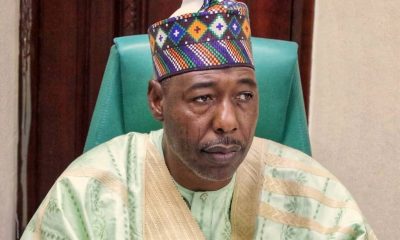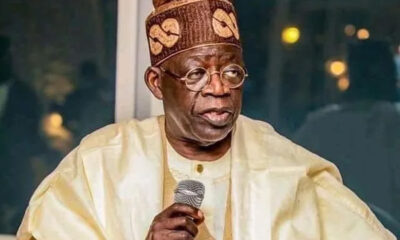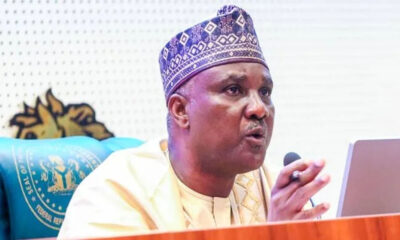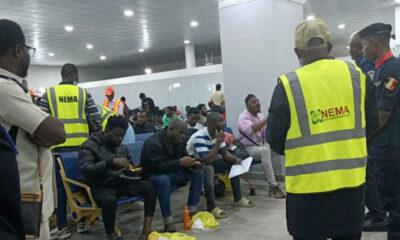Opinion
Nigerians must replace tithes with taxes for speedy development– Reno Omokri
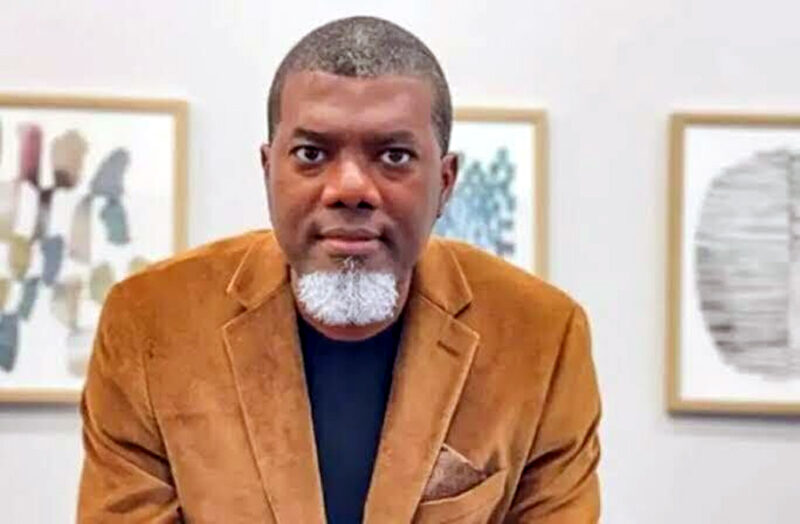
Nigerians must replace tithes with taxes for speedy development– Reno Omokri
Reno Omokri, ex-aide to former President Goodluck Jonathan, says if Nigeria must progress, Nigerians must stop paying tithes in churches and start paying taxes to the government.
He said Nigerians preferred paying tithes to their churches and then demanding for roads and proper infrastructure from their government to whom they hardly pay taxes.
“No matter how corrupt and inept you think the Nigerian government is, they are far more open and transparent about what they do with the little taxes you pay than any church in Nigeria. Do you see that guy who probed Emefiele? Jim Obazee.
“If President Tinubu should ask him to probe Nigerian mega-churches, some GOs would be in jail. Nigerian churches are some of the least regulated entities on planet earth,” Omokri said on his X page.
He added: “Okay, which church in Nigeria has given you, as a member, a breakdown of what they do with your tithes? Yet, you see their General Overseers and Senior Pastors living extravagant lives, even where there is extreme poverty in their congregations. They build schools, often with members tithes, that the children of those members cannot attend.
“In contrast, the Nigerian government publishes an annual budget of what they will do with your tax Naira. A budget that can and is often scrutinised and criticised by the public and media, because it is a public document. And when they spend the appropriated monies, the Freedom of Information Act allows you to get information on who was paid what, when and how.
“That is how the Minister of Humanitarian Affairs and Poverty Alleviation was exposed. But can you dare ask your pastors what they do with your tithes?”
READ ALSO:
- Fuel Scarcity: Marketers blame supply hitch as queues resurface in Lagos, Ogun
- Over 50,000 Nigerian pilgrims to perform 2024 Hajj – NAHCON
- New electricity tariff: DisCos get April 11 deadline to refund wrongly billed customers
Omokri stated that Nigeria would never reach its full potential if Nigerians did not pay taxes, saying “It works both ways. Taxes give the government more funds, and make the citizens more vigilant over how their government spends their money.
“According to the World Bank, taxes account for 39% of the GDP of Germany, 46.3% in Denmark, 45.4% in France, 42.9% in Sweden and Belgium, 34.1% in Japan, and 23.7% in South Africa. But in Nigeria, it is an abysmally low rate of less than 10%.
“Despite the above, no citizen of any country is as entitled as a Nigerian. Our government earns about $30 billion a year from oil and gas to a population of 220 million people. And on that basis, we want cheap fuel, electricity, and high minimum wages, as well as free education and pipe-borne water.
“Yet, according to Statistica, Nigeria has a higher rate of paying tithes than the above listed countries. Why are we not individually and collectively prospering more than those countries?
“The statistics are clear: countries with high tax payments and low tithe payments prosper individually and collectively more than nations with low tax payment and high tithe payment.
“Yeshua said “give to Caesar what belongs to Caesar, and give to God what belongs to God.” Money belongs to Caesar (government). Pay your taxes. Tithes in Scripture were ONLY agricultural. They were NEVER monetary. And they were only requested by God from Jews and paid ONLY to Levites-Numbers 18:24.
And tithes were agricultural only. The reason for this was that the Levites were not allowed to farm. The modern payment of tithes in Christendom (as opposed to Christianity) cannot be supported by ANY Scripture.
“These preachers will use a verse from Malachi 3:10, which states: “Bring the whole tithe into the storehouse, that there may be food in my house.”
“However, note that a storehouse refers to a barn, where only food and other agricultural produce were kept. The Jews were never asked to bring money.
“Additionally, there are multiple other laws in Malachi and the laws of Mosaic, which include laws allowing polygamy. If they take that law from Malachi, why do they not observe the other 612 or so other laws? Because it is all about the Benjamins, baby!”
Nigerians must replace tithes with taxes for speedy development– Reno Omokri
Opinion
[ICYMI] Ilorin and Dan Fodio’s deadstock

[ICYMI] Ilorin and Dan Fodio’s deadstock
By Lasisi Olagunju
(Published in the Nigerian Tribune on Monday, 15 July, 2024)
Justice Ibrahim Kolapo Gambari, JCA became the Emir of Ilorin in August 1995 and decreed the ‘Kolapo’ in his name abolished. He said he should thenceforth be known and called Alhaji Ibrahim Sulu-Gambari; all former documents remain valid. He gave no reason for his decision but not a few of us thought it was his way of hiding the Yoruba content in the bloodstream of the House of Shehu Alimi, his Fulani roots. When Emir Ibrahim Sulu-Gambari took that unusual, surprising step, little did he know that the day would come when his aunt, Hajia Maryam, married to a king of Kano, and her sons would suffer discrimination and be tagged ‘Yoruba’.
It is the way of toads to detour into any available crater whenever it discovers it can no longer find its way to the stream. The chairman of the New Nigeria People’s Party (NNPP) in Kano State, Hashim Dungurawa, a few days ago addressed journalists in Kano and alleged that President Bola Tinubu was working hard to impose the deposed 15th emir of Kano, Aminu Ado Bayero, on the emirate because he shared same Yoruba background with the president. “If the President thinks he will use a few of his kinsmen in Kano and the alleged Bayero’s Yoruba lineage to continue to keep the deposed Emir Aminu Ado Bayero in the state, let him wait for 2027, we will show him that those people will not help him,” Dungurawa warned. When you heard his threats about 2027, you would think that Kano votes mattered in 2023. The votes were like rain water; they were surplus but they were wasted, unhelpful, unuseful to the person they were cast for. The same will happen in 2027.
The Kano NNPP man who spoke is not a lone wolf. He is a member of a preening pack that think themselves special and others of lesser breed. I understand what he voiced out has been in the whispering lips of the sands and boulders of Kano even before the emirship crisis unfolded. They call the deposed emir “son of the Yoruba woman.”
Around here, a child does not claim his father’s compound and disclaim his mother’s homestead. Aminu Ado Bayero is a grandson of the 8th emir of Ilorin; Aminu’s mother was a sister to the mother of the incumbent Ilorin emir. Ordinarily, this long line of Fulani ancestry should be a plus for whoever has it in the Fulani north, but in the peculiar politics of our feudal Nigeria, the Ilorin ruling family would only be recognized as ‘northern’ if they knew their limits. I hope they know now that they are fringe elements and fringe elements can never be allowed to dip their hands into the main bowl of the house.
Hashim Dungurawa, the NNPP chief who said loudly what was being said in whispers, is even said not to be a Fulani himself. He is said to be Hausa – the original owners of Kano before the Dan Fodio Jihad threw them into the sea of the barren street. Did you notice the irony here?
READ ALSO:
- BREAKING: Kano Assembly passes bill to establish second-class emirates
- Court dismisses Emefiele UK medial travel application
- Elon Musk to support Trump’s re-election with $45m a month
There is no ‘pure’ blood anywhere. It is 201 years this year that Afonja lost his ancestral throne of Ilorin to the children of Sheikh Alimi, his spiritual adviser and friend. In those two centuries, the children of Alimi, from generation to generation, have remained Fulani only by name, history and ancestry. Mohammodu Odolaye Aremu was a Dadakuada musical artiste of Ilorin ancestry. He died in 1997. He expended a great deal of his career years effusively singing the cultural and political histories of his city of birth for the careful to note and ponder on. Emir Mohammed Sulu-Gambari reigned in Ilorin from 1959 to 1992. He was the father of the present Emir Ibrahim Gambari. Odolaye waxed a record for the grand old man chanting his oríkì. He serenaded him “Alabi Òpó mo gbádùn oko mi ojo/ Súlú Oba gbogbo wa ní Ilorin…(Alabi Opo, I enjoy my lord / Sulu, our king in Ilorin). ‘Alabi’ is a personal Yoruba oríkì; the ‘Opo’ that follows it is the lineage panegyric (oríkì orílè). That lineage is Òpómúléró, the nearest English translation is ‘mainframe’. That is a lineage that feeds stubborn wine to stubborn child and proceeds to send that recalcitrant, drunk child to war. They proudly say they did it to Afonja who went to war never to come back:
Òpó tí ò gboràn, e kojú è síná
Iná tí ò gboràn, e kojú è sómi
Omi tí ò gboràn, baba wa ní á fi pon’tí
Otí tí ò gboràn, e f’ómo líle mu
Omo líle tí ò gboràn, e rán an rojú Ogun
Sebí Ogun náà l’Àfònjá lo tí ò fi padà wálé mó
Omo kèké ta dídùn, aso lèdìdì ènìyàn.
Emir Mohammed Sulu-Gambari was alive when Odolaye waxed his record and called him Alabi Opo. The emir did not ask the bard to shut up and did not say he wasn’t what he was called. He valued and enjoyed the Yoruba content of his existence so much that his children remained valued additions to the cultural assets of the land they inherited while maintaining their links to their paternal ancestors.
It is interesting that people who lost their ‘critical’ voices in the eight years of Muhammadu Buhari’s ruinous reign are now raising their chords. And, Tinubu, because he is a Yoruba man, is the whipping boy for the years of the Buhari locust. What they do with the successor to their Bayajidda II is what the Germans call “den Hund vor dem Löwen schlagen” – beat a dog before/for a lion. They think their throats should be the only expressway to heaven. Dungurawa’s snide broadside to the Yoruba was vilely divisive, provocative and unfortunate but his Kano and Ilorin victims must thank him (and his masters) for waking them up. They (the victims), at least, should be aware now that the butterfly may be winged and fly like a bird, but it is not a bird and won’t be allowed to enjoy bird privileges. It will be interesting to know how ex-emir Aminu, his brothers and sisters in Kano and their uncles in Ilorin took the statement from those they thought were their kinsmen- the authorities in Kano.
READ ALSO:
- JUST IN: Sanwo-Olu gives N100,000 each to Lagos Batch B Corps members
- Kano State Govt slams new charge on ex-Gov Ganduje
- Osun govt issues warning as scammers hack governor’s phone number
It is very interesting that for the Fulani North, because of the throne of Kano, Ilorin is no longer a Fulani town. God is great. But I commend them. It is always good to drop whatever is not yours no matter how long you’ve held on to it. Ilorin did not start as a settlement of the Fulani; the emirate there is a progeny of conquest. It is a victim of the characteristic Yoruba blind-fight for thrones. They fought and shredded their velvet, the Fulani picked it up and from it sewed an empire. The modern version of how 19th century Yoruba treated their heritage is what you see in Kano and Sokoto today. My friend in Kaduna told me that in Sokoto and Kano after the last elections, deposition of kings was the sole slogan: “Sabon Gwamna, Sabon Sarki” (new governor, new king). And they are working hard at it. That was the Yoruba misadventure that delivered Ilorin to Fulani forces in 1823/24.
There is an irony in some Kano people calling a prince or princess from Ilorin an outsider. The founder of Ilorin emirate, Sheikh Al-Salih (alias Shehu Alimi), was a Fulani who hailed from Tankara in present Niger Republic. It was from there he came to school in Bunza, present Kebbi State in today’s Nigeria. Just like him, Uthman Dan Fodio, the founder of the Sokoto caliphate, and by extension the emirate of Kano, was born in Maratta in the Tahoua region of today’s Niger Republic. An account said Alimi was a contemporary of Uthman Dan Fodio with Jibril bin Umar as their common teacher. But history did not say Alimi started out as a jihadist in the mould of Dan Fodio. He was a simple preacher and itinerant spiritualist who hawked his knowledge and power from one Yoruba town to the other. He was in Old Oyo, Iseyin, Ogbomoso and Kuwo before Afonja, a prince of Oyo, invited him to Ilorin in aid of his independence (rebellion) against his lord, the Alaafin. The rest is well recorded by history.
The more you read Ilorin’s well-documented history, the more you understand the tapestry of its ethnic configuration. There are tomes of materials available to the patient who is also curious to know. There is Ahmad b. Abi’s ‘Talifakhbar al qurun min Umara ‘ balad Ilurin’ (1912) with its critique by H. O. Danmole (1984). There is H.B. Hermon-Hodge’s ‘Gazetteer of Ilorin Province’ (1929). There is H. O. Danmole and Toyin Falola’s ‘The Documentation of Ilorin by Samuel Ojo Bada’. There is J.A. Atanda’s ‘The Fulani Jihad and the Collapse of the Old Oyo Empire’. There is also Stefan Reichmuth’s ‘Imam Umaru’s Account of the Origins of the Ilorin Emirate’ (1993); and then, Ann O’Hear’s ‘Elite Slaves in Ilorin in the 19th and 20th Centuries’ (2006). There are many more from local historians here and there.
READ ALSO:
- Kagame wins fourth term as Rwanda president with 99% votes
- JUST IN: Another Reps member, Ekene Adams, dies
- BREAKING: NECO releases 2024 examination results for Unity schools
Ilorin has the enviable luck of being a melting pot for all races, “tribes and tongues”. You find there people who would proudly say their ancestors were Fulani or Hausa or Kanuri or Dendi, Nupe, Baruba, Wangara, even Arabs. Yet, they are all ‘Yoruba’ today and they are proud to speak the language. You want to ask why the conqueror speaks the language of the conquered? It is because the Yoruba gene is very resistant to assimilation; the conquerors only got the throne, the soul refused to stay in their pouch. The Yoruba culture does what dams do to their surrounding environment. Their backwaters fester and consume their catchment areas. It is arguably the only African culture that survived slavery outside Africa. Go to Brazil, to Cuba and Trinidad and Tobago, Saint Lucia, Guyana, Haiti, Jamaica, about 200 years after slavery, descendants of Yoruba slaves there proudly raise the banner of their fathers. That is the case with the essential Yoruba-Ilorin.
While politicians in Kano are busy making identity nooses to hang their opponents, their street is dead drunk with tears of hunger and want. But the people rarely matter in matters like this. They won’t ever revolt; re-vote of their tormentors is what they will do. So, I have no dog in the bitter contest for the throne of Kano. The same should be our reaction to the machete attacks on the traditional powers and privileges of the Sultan of Sokoto by the state governor. At best, I watch events in those places the way I watched Sunday’s epic final of Euro 2024 football match between England and Spain. The Game of Thrones in the Fulani north, from Kano to Sokoto, is therefore, to me, entertainment. We run commentaries such as this only because, as the Yoruba say, it is always good to show the goopy snail that its eyes are caked with mucus.
Krishna Udayasankar, Singapore-based Indian writer and author of ‘3’ – a novel on the founding of Singapore, believes that “no empire lasts forever, no dynasty continues unbroken” How is the Kano kingship crisis going to end for the ruling class in northern Nigeria? When you combine what is happening in that city with the simmering volcano in Sokoto, would you be wrong if you say the signs portend sundown for the elaborate empire built by Dan Fodio in the first decade of the 19th century? No intervention can save that empire from itself. Maybe that elaborate realm has to die for Nigeria to live and thrive.
While the battle for thrones rages on, the Dan Fodio clan got a whole ministry from Tinubu last week. The president called it the Ministry of Livestock Development. I heard their elites’ happy footfalls. Who told the Fulbe that their problem would be over with a special ministry for their cows? Something tells me they know too that they are only interested in the billions that will be pumped into that loss centre. My dictionary says the opposite of livestock is deadstock. Something tells me that is the fruit from that luxuriant tree unless they change their ways. But they won’t change. For them, it is already past midnight.
[ICYMI] Ilorin and Dan Fodio’s deadstock
Opinion
Farooq Kperogi : LGBTQ storm in $150bn Samoa deal teacup

Farooq Kperogi : LGBTQ storm in $150bn Samoa deal teacup
In the last two days, my social media feed has been suffused with impassioned expressions of grief and outrage from Nigerians over a putative June 28 agreement that the Nigerian government has signed with the European Union to legalize LGBTQ+ rights in the country in exchange for a $150 billion economic package.
It turned out that a July 4 Daily Trust titled “LGBT: Knocks As Nigeria Signs $150 Billion Samoa Deal” might be the source of the cultural and social anxiety that Nigerian are expressing about Nigeria becoming an “LGBTQ+ nation,” as someone put it on social media.
Unfortunately, the Daily Trust story failed to cite the portion of the Samoa agreement that mandates Nigeria to change its laws to accommodate LGBTQ-friendly policies. It based its headline and entire story on an unnamed report without even citing evidence from the report.
“The agreement reportedly has some clauses that compel underdeveloped and developing nations to support the agitations by Lesbian, Gay, Bisexual, and Transgender (LGBT) community for recognition, as condition for getting financial and other supports from advanced societies,” it wrote.
The paper then proceeded to fish for people who would express fury and consternation over a piece of information that it hasn’t originally seen, and these expressions of fury and consternation created a self-reinforcing loop. We call this circular reporting.
Circular reporting, also called false confirmation, occurs when a source contrives a piece of information, repeats the information to multiple sources in the form of interviews (in the case of journalism), and then cleverly passes off the views of the interviewees as the original source of the information. It’s basically creating something from nothing.
I read the 12-page agreement titled “The Samoa Agreement with African, Caribbean and Pacific States” that is posted on the website of the European Parliament. There is no obligation in the agreement that requires African, Caribbean, and Pacific countries adopt LGBTQ rights.
READ ALSO:
- No guy has toasted me in five years, UK-based lady laments scarcity of men
- [UPDATED] Euro 2024: Spain knock out hard-fighting Germany 2-1, hit semi-finals
- Spate of attacks, kidnapping worry Afenifere, seeks review of security architecture
However, page 2 of the document states, “The chapter on human rights should explicitly list the forms of discrimination that should be combated (such as sexual, ethnic, or religious discriminations) and mention sexual and reproductive rights.”
Even so, there is an admission in the document that several countries, including European Union members, are resistant to enshrining “sexual rights” in their legal codes.
On page 5, for instance, we see the following: “As of 22 November 2023, however, 30 OACPS members, mostly African and Caribbean, had failed to sign…. Some leaders explained they wanted to check whether the agreement would be compatible with their legal order, notably as regards same-sex relations and sexual health and rights.
“This move surprised several commentators, as the wording on these topics does not go beyond existing international agreements…) and was agreed after years of negotiation; in addition, the agreement includes the possibility for the signatories to make interpretative declarations or reservations.”
Again, page 8 of the agreement notes that not only African, Caribbean, and Pacific countries but also some European Union members resisted being bludgeoned into agreeing to LGBTQ+ rights.
It says, “While the parties will commit ‘to promote, protect and fulfil all human rights be they civil, political, economic, social or cultural’, some ACP states were reluctant to see the foundation agreement mention sexual orientation and gender identity (LGBTI rights) – an issue on which there are also differences among EU Member States.
“As a matter of compromise, the parties will commit to the implementation of existing international agreements – notably the International Conference on Population and Development Programme of Action on sexual and reproductive health and rights, the Beijing Platform on gender equality and their follow-up (negotiated agreement, Article 36). The wording however falls short of the EU negotiators’ ambitions,” the document says.
Further down on page 9 of the document, it was made certain that the European Union was unable to universalize the merit of protecting sexual health. “Access to sexual and reproductive health services and information will be promoted – without further details, as the parties have varying views on this concept.”
READ ALSO:
- Israeli team led by spy chief Barnea meets Qatari mediators on Gaza deal
- Four suspected vandals of TCN facilities arrested in Kaduna
- Stop posting camp activities on social media, NYSC DG warns Corpers
In other words, although the European Union did want to get countries in Africa, the Caribbean, and the Pacific to embrace an expansion of the notion of human rights to include sexual minorities, they got a sustained pushback, not only from them but also from some European Union members.
The only rights that Nigeria and other countries agreed to in the Samoa Agreement are the rights they have already been signatories to for years such as the African Charter on Human and Peoples’ Rights, the International Covenant on Civil and Political Rights (ICCPR), the International Conference on Population and Development Programme of Action, and the Beijing Platform.
Plus, a provision in the agreement, which states that countries that signed the agreement have the latitude to “make interpretative declarations or reservations” about controversial issues means that they can understand “sexual discrimination” in ways that suit their cultural peculiarities and existing laws.
Anyone who takes the trouble to actually read the 12-page agreement would know that our lazy, stenographic news media ecosystem has merely created a storm in a teacup. In addition to the reality that the cultural soil in Nigeria is too inhospitable for the seeds of LGBTQ+ rights to germinate, much less flourish, no halfway sane Nigerian politician would risk irrecoverable political, social, and symbolic self-diminution by signing an agreement that violates an existing domestic law, i.e., the Same Sex Marriage Prohibition Act, and that causes extreme anxiety in a cultural conservative country like ours.
In all this, my major worry is that Nigerians waste precious emotions and expend tremendous amounts of energy over issues that are really of no consequence to their everyday lives but look away when threats that smolder their souls and annihilate their very existence confront them. The World Bank and the IMF routinely give loans to Nigeria and attach punishing conditionalities to them.
The removal of subsidies on everything, the devaluation of the naira, the shrinking of expenditure on education and health, etc. are some of the conditions these evil institutions attach to the loans. Someone close to people in power told me a few days ago that Tinubu’s resistance to the IMF’s insistence that he increase petrol price has dissipated and that it’s a matter of when, not if, he’ll approve a price increase of over N1,000 a liter.
When that happens, people will merely grumble, thicken their skins, make peace with their suffering, and move on. So long as LGBTQ+ people have no rights, so long as our religious and cultural values are respected, it doesn’t matter if the IMF and the World Bank instruct our leaders to murder us piecemeal.
That’s why people in positions of power will perpetuate their dominance of society and sustain their oppression of the people intergenerationally. They know that most people are governed by their emotions, not their intellect, by their hearts, not their heads.
The day Nigerians are as engaged and as enraged as they are about this non-existent LGBTQ+ conditionality in a European Union economic package as they are about the IMF’s and the World Bank’s conditionalities that ensure that our people continually live at the subhuman level is the day true liberation will start.
Farooq Kperogi : LGBTQ storm in $150bn Samoa deal teacup
Farooq Kperogi is renowned columnist and United States-based Professor of Journalism.
Opinion
Further thoughts on being sick and tired about Nigeria – Farooq Kperogi

Further thoughts on being sick and tired about Nigeria – Farooq Kperogi
When I wrote my column last week about being sick and tired of being sick and tired, I had not the slightest inkling that it would resonate with such vast and varied strata of the Nigerian public sphere. I merely wanted to ventilate the pent-up disillusionment that had welled up in me over time and expected most people to ignore my self-absorbed rumination.
Columnism is, after all, self-expression before it is public commentary. In fact, all forms of writing are conscious and unconscious self-portraitures. As Nobel-Prize-winning South African author John Maxwell Coetzee noted in his 1994 book titled Doubling the Point, “All writing is autobiography; everything that you write, including criticism and fiction, writes you as you write it.”
That was why I was overcome with pleasant disbelief by the unexpectedly overwhelming profusion of identification with the sentiments I expressed in my column, by the cornucopia of pleas to me to not stop writing, and by the careful, flattering chronicling by readers of the impact that my writing has had and continues to have in Nigerian politics and policies.
Let me make this clear: I won’t stop writing, haven’t given up on Nigeria, and have resolved to resist the disempowering but tempting tyranny of cynicism and surrender. I was merely giving vent to my disillusion at our prolonged infancy as a country, and it was therapeutic. I am glad that it also helped provide conscious language for others to articulate their bottled-up mental and emotional exhaustion. I hope that our passions will be rejuvenated after we vent because giving up is not an option.
One of the scores of emails I received over the past few days in response to the column humorously pointed to my rather unusually caustic spat with the Supreme Court in February 2023. It noted that of the thousands of people who routinely criticize the Supreme Court, I was the first and so far the only person in Nigeria’s history (I haven’t fact-checked this claim) whom the Supreme Court considered worthy of an individual response, even if the response was an apoplectic and threatening one. “If that isn’t making a difference, I don’t know what is,” she wrote.
Others called my attention to the Nigerian Labor Congress borrowing the perspective and language of the column I wrote on the economic apartheid in socially stratifying electricity consumption into “bands,” among scores of examples they identified as solid evidence of the seepage and utility of my thoughts in arenas that matter.
READ ALSO:
- Appeal Court upholds Nollywood actor Baba Ijesha’s five-year jail term
- N25.7 billion fraud: Supreme court upholds Francis Atuche’s conviction
- Minister arrested over alleged witchcraft
Well, I am probably guilty of what I choose to call a vulgar uniformization of markers of success of endeavors, by which I mean the tendency to use the same yardstick to measure the impact of all actions. In today’s Nigeria, for instance, conspicuous consumption—big cars, glitzy houses, expensive phones, sartorial extravagance, lavish gastronomic indulgence, etc.—has been uniformized as the only legitimate marker of success.
Even immensely accomplished, well-regarded, and far-famed professionals whose contributions to their fields will outlast them consider themselves—or are made to consider themselves—as “failures” if they are not “rich,” if they can’t flaunt vain indicators of prosperity, if they are just merely modestly comfortable. This crude uniformization of pointers of success is the main driver of the rat race for wealth by any means.
Maybe, I was guilty of uniformizing how impact is measured. Expectation of immediate, drastic, and dramatic change in policies and practices in response to sustained critical interventions is unrealistic, even quixotic. Persuasion takes time and work. Even at its best, it is often a gradual process consisting of small, incremental changes at a time.
That’s why revolutions take time to gestate and incubate before they burst forth. All revolutions start out as disparate resentments that coalesce into mass resistance, often at the rhetorical level. Mass resistance then blossoms into spontaneous, leaderless protests. If the frenzy and rage of the protests are sustained by the conditions that inspired them, they culminate in a rebellion.
If the rebellion has a self-aware, transcendent, ideologically situated vanguard, it can achieve the status of a revolution. And it can start with something as seemingly inconsequential and belaboring as writing.
Well, as I pointed out last week, this isn’t the first time I’ve questioned the efficacy of my popular interventions and (temporarily) divested my emotions from the home of my birth (where my heart always is) in frustration.
About this time last year, I chose to impose on myself a moratorium on active Nigerian political commentary and social media intervention, which was occasioned yet again by my temporary loss of hope in the capacity of Nigeria to reform.
After self-reflection, I concluded that the passions, energies, commitments, hopes, and aspirations that I had invested in Nigeria through my commentaries and engagements were wasted efforts because they made no difference. I concluded that I was merely wailing in the wilderness and that no one of consequence heard me.
READ ALSO:
- Tenure of FCT council chairmen expires in 2026, INEC clarifies
- I lost over N10m to Abuja market fire, trader laments
- Tale of woes in Abuja market after fire outbreak
Even when I thought I was heard, I didn’t think I made any impact. The vitriol and threats to my life that my engagements invited, particularly during Muhammadu Buhari’s presidency, would be worth it, I thought, if I made a difference, if I galvanized enough people to set aside their primordial differences and demand good governance from whoever was in power. After more than two decades of doing the same thing with the same result, I thought I was done.
Then, out of the blues, I became aware that the legendary Professor Toyin Falola—author of nearly 200 books with some of the world’s most prestigious presses, one of the world’s most cited living scholars, and an endowed Professor of History at the University of Texas at Austin and Extraordinary Professor of Political Science at University of Pretoria— had written a book titled “Citizenship and the Diaspora in the Digital Age: Farooq Kperogi and the Virtual Community” that chronicles, analyzes, evaluates, and engages with the social, political, and cultural commentaries in my columns and social media platforms.
On June 15, 2023, an academic conference was also organized by the University of Pretoria’s African Centre for the Study of the United States with the theme “Farooq Kperogi, The Digital Age and US-African Diaspora Diplomacy,” at the behest of Professor Falola, where scholars from around the world discussed and analyzed my scholarship, newspaper columns, and online dialogic engagements.
I felt at once honored, flattered, and appreciated in ways I hadn’t before. I asked myself: so, someone of Professor Falola’s heft and gravitas notices my writing enough to find it worthy not just of his time but of his scholarly engagement in a book form? Had I been underrating the value of what I did?
As I said in my remarks during the conference, it was indescribably humbling when a vastly accomplished, larger-than-life, widely respected scholar like Professor Falola about whom books have been written, in whose honor annual transnational scholarly conferences are held, who is the most famous African scholar in the United States, and from whom I derive inspiration and guidance in my scholarly pursuits found me worthy to write an entire book about even when I consider yourself a mere mid-career academic who is still building his work. It’s an honor I truly believe I am wholly unworthy of but that I nonetheless embrace and cherish.
In moments of emotional weakness, which is natural when you’re the citizen of a country like Nigeria whose leaders serially violate even the most modest expectations of good governance, I will always remember the encouragement I received from esteemed intellectual patriarchs like Professor Falola, the hundreds of readers who wrote to me and left comments on my social media pages, and my heightened self-awareness that the impact of writing is often osmotic and almost imperceptive but significant nonetheless.
I have also come away with another insight: Passionate criticism of governance is often evidence of deep devotion to the progress of the country. Its absence can be a signal of the loss of hope in the redemptive capacity of critical engagement with the state. That’s not a state any state should want its citizens to be in.
On Thursday, I read Nyesom Wike railing against government critics like Senator Shehu Sani by saying, “The fact that many of you are activists does not mean you will do well if you were in our position. We have activists who have failed woefully in office. We have seen activists that were given appointments and yet they didn’t perform.”
Well, we don’t criticize because we think we would do a better job than the people we criticize. An English proverb that I like to quote in response to these sorts of pushback from people in government, says the onlookers, not the participants, see most of the game.
Coaches and technical advisers are needed in games not because the coaches and technical advisers are better than the players (several coaches and technical advisers, in fact, don’t have half the talent of players), but because the coaches and technical advisers have the benefit of technical knowledge and, most importantly, critical detachment from the field of play, which enables them to see the blind spots that players don’t and can’t see.
Further thoughts on being sick and tired about Nigeria – Farooq Kperogi
Farooq Kperogi is a renowned newspaper columnist and a United States-based Professor of Journalism.
-

 News2 days ago
News2 days agoNLC can’t withdraw from protest it didn’t organise – Ajaero
-

 News3 days ago
News3 days agoNorthern group attacks Reps Minority Caucus for demanding Nnamdi Kanu release
-

 News3 days ago
News3 days agoMinimum wage: Akpabio says domestic workers can’t earn less than N70,000
-

 News2 days ago
News2 days agoFG unveils training programme for 1,000 Nigerians in AI, blockchain
-
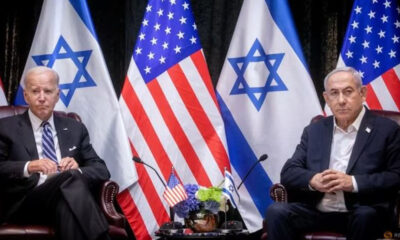
 International17 hours ago
International17 hours agoNetanyahu, Biden hold talks over tense Gaza ceasefire
-
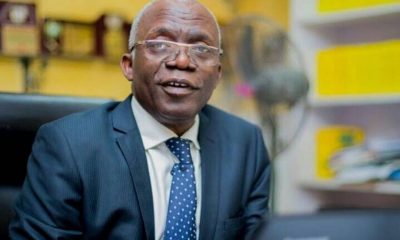
 News3 days ago
News3 days agoFalana to FG: Threatening Nigerians won’t stop mass protest
-
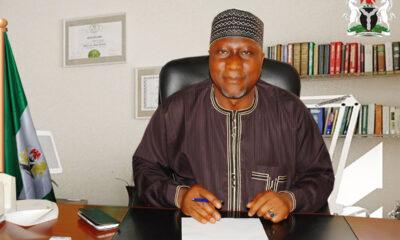
 metro1 day ago
metro1 day agoNERDC Executive Secretary Prof Ismail Junaidu slumps, dies
-

 metro2 days ago
metro2 days agoPastor remanded for allegedly defiling teenager, attempting abortion





